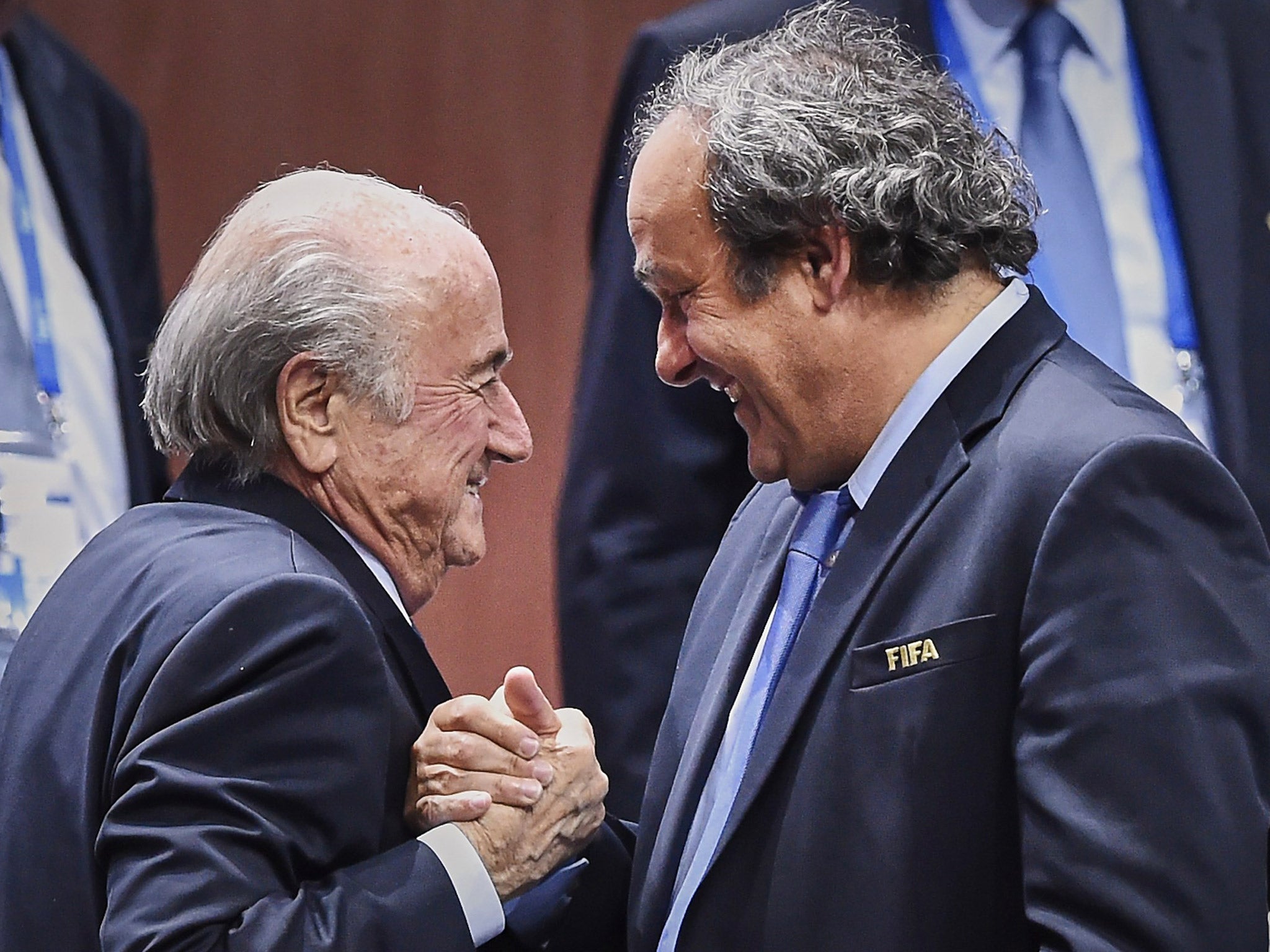Michel Platini is far too steeped in Fifa's past to be its saviour
The Frenchman might have stood two months ago, had he thought he stood any chance of winning

Your support helps us to tell the story
From reproductive rights to climate change to Big Tech, The Independent is on the ground when the story is developing. Whether it's investigating the financials of Elon Musk's pro-Trump PAC or producing our latest documentary, 'The A Word', which shines a light on the American women fighting for reproductive rights, we know how important it is to parse out the facts from the messaging.
At such a critical moment in US history, we need reporters on the ground. Your donation allows us to keep sending journalists to speak to both sides of the story.
The Independent is trusted by Americans across the entire political spectrum. And unlike many other quality news outlets, we choose not to lock Americans out of our reporting and analysis with paywalls. We believe quality journalism should be available to everyone, paid for by those who can afford it.
Your support makes all the difference.There can be no more certain proof of Michel Platini’s unsuitability for the job of Fifa president than the fact that he will almost certainly get it.
The Frenchman, who stands almost alone in football’s political realm in that he was a wondrous player rather than a lawyer, administrator or Arabian prince, surprised no one by formally declaring his intention to stand in the extraordinary Fifa presidential election in February with a letter to the football chiefs in Fifa’s 209 member nations.
“I was guided by the esteem, support and encouragement that many of you have shown me,” he said.
Platini is certainly not short of support, with Europe, Asia and North, South and Central America all backing him. In other words, most of the same bunch who decided in May that Sepp Blatter was the right man to carry on with the job two days after a load of his top executives had been dragged out their beds and slung in jail.
Already the Jordanian Prince Ali bin al-Hussein, the only man who ended up mounting a challenge to Blatter (and almost certainly at Platini’s request), has criticised the Uefa president’s decision.
“Platini is not good for Fifa,” he said. “Fifa is engulfed in scandal. We must stop doing business as usual. The practice of backroom, under-the-table deals must end.”
Platini might have stood two months ago, had he thought he stood any chance of winning. Instead he coordinated Uefa’s odd, multi-ball attack strategy, with the same PR company managing the campaigns of Prince Ali and Luis Figo. (On such a crucial day of news for Fifa, the Portuguese, by the way, was busy tweeting pictures of his round of golf, which places the sincerity of his challenge in its correct context). The situation could hardly be more of a mess. Even Platini’s statement admits “recent events force the supreme governing body of world football to turn over a new leaf and rethink its governance”.
But in the meantime he will campaign to become head of an organisation which has proved beyond all doubt it is systemically incapable of electing a suitable president.
There is soon to be a supposedly independent reform task force set up to propose ways in which Fifa can govern itself better, but it has only seven weeks to report – a week of that has already gone and a head has yet to be appointed.
How Fifa reforms itself over the coming months is of far more importance than who is elected president. The recommendations of the task force will only be taken seriously if they urge a near complete destruction and reformation of the organisation, substantially reducing the role of president to not much more than a figurehead.
The whole process is almost irrevocably tarnished in any case, because it will take place in this impossibly long 12-year twilight zone between the worst, most controversial decision in sporting history – awarding the World Cup finals to Qatar – and the actual realisation of it. An absurdly long time, itself the almost certain product of venal corruption.
It is hardly likely, in the meantime, that either of the two simultaneous international police investigations into corruption at Fifa will find evidence of wrongdoing in Qatar’s bid, summoning forth a problem for Fifa of gargantuan proportions that will make it even more impossible to forget that Platini proudly voted for a superheated World Cup in a cruel and tiny nation totally unsuited for it. And impossible to ignore the suggestion that will not go away – that he did so at the request of the then French President Nicolas Sarkozy at a secret luncheon between Platini, the President and the Qatari Emir, to smooth the passage of large trade deals between the two nations.
Platini’s original entry into the world of football politics, a world that is and will likely continue to be a magnet for the wrong sort of people, came with noble intentions. He wanted merely to put on a successful World Cup in his home country.
But as Blatter’s friend and protégé for long years following on from France 1998, there can be little doubt that he has embraced the scheming and chicanery and machinations that characterise it now. Fifa, it is widely agreed, needs fundamental change. That the person to deliver such change could possibly be a man so closely associated with its long years of ruinous decline is as laughable as the organisation itself.
Join our commenting forum
Join thought-provoking conversations, follow other Independent readers and see their replies
Comments